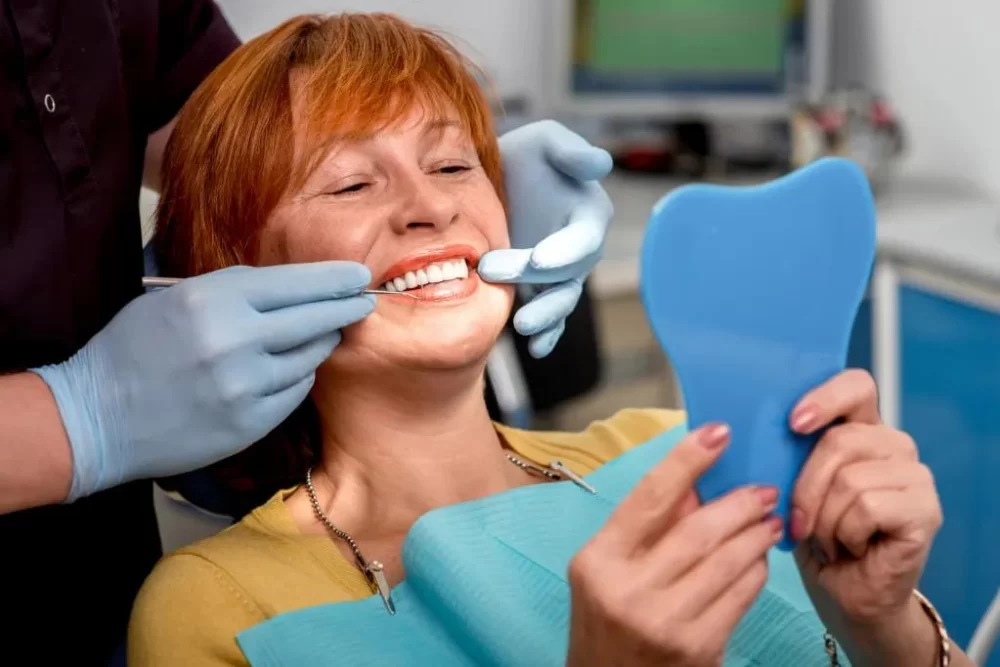
- aging-and-oral-health-challenges
- why-dental-hygiene-is-crucial-in-senior-years
- common-dental-conditions-affecting-seniors
- daily-oral-care-practices-for-seniors
- real-story-dental-neglect-in-senior-years
- visiting-the-dentist-regularly-after-retirement
1. Aging and Oral Health Challenges: What Changes as We Grow Older?
As the body ages, the mouth isn’t spared. Seniors often experience changes that directly affect dental health, including dry mouth, gum recession, weakened tooth enamel, and a higher risk of infections. Medications commonly prescribed in older adulthood—like those for blood pressure or cholesterol—can also reduce saliva flow, making it easier for bacteria to flourish and cause dental problems.
1.1 Why Saliva Production Declines with Age
One under-discussed topic is xerostomia, or chronic dry mouth, which significantly increases in seniors. Without enough saliva to neutralize acids and wash away food particles, the risk of tooth decay and gum disease rises. Staying hydrated and using dentist-approved mouth moisturizers can help alleviate symptoms.
2. Why Dental Hygiene Is Crucial in Senior Years
The importance of dental hygiene for seniors goes beyond having a bright smile. Poor oral health has been linked to serious health conditions such as heart disease, diabetes, and respiratory infections. Infections that start in the mouth can spread through the bloodstream, impacting overall well-being and even shortening life expectancy.
2.1 Preventing Systemic Health Issues
Maintaining senior dental care routines reduces inflammation in the body—a factor tied to many chronic diseases. Brushing, flossing, and regular dental visits not only help avoid pain and tooth loss but also contribute to a longer, healthier life.
3. Common Dental Conditions Affecting Seniors
Older adults are especially vulnerable to a range of oral health issues. Understanding these conditions is the first step to effective prevention and treatment.
3.1 Gum Disease
Periodontitis, an advanced form of gum disease, affects nearly 70% of adults over age 65. It can lead to bone loss and tooth mobility if not addressed early.
3.2 Root Caries and Worn Enamel
As gums recede, tooth roots become exposed and more prone to decay. Seniors often face increased tooth sensitivity and wear, especially if they have a history of acid reflux or heavy brushing.
3.3 Ill-Fitting Dentures and Oral Sores
For those who wear dentures, poor fit can cause mouth sores, infections, and difficulty eating. Regular dental checkups are essential for maintaining denture comfort and function.
4. Daily Oral Care Practices for Seniors
Developing a consistent oral hygiene routine tailored to the needs of older adults is key to preserving dental health.
4.1 Brushing and Flossing Techniques
Use a soft-bristled toothbrush or an electric one if mobility is an issue. Seniors should brush twice a day with fluoride toothpaste and floss daily, using floss picks or water flossers if needed.
4.2 Mouthwash and Saliva Substitutes
Antibacterial or fluoride mouthwashes can reduce plaque and prevent decay. Saliva substitutes or oral moisturizers are recommended for dry mouth, especially in individuals taking multiple medications.
4.3 Diet and Hydration
A nutrient-rich diet helps support gum and bone health. Encourage frequent water intake to combat dry mouth and improve digestion—hydration supports overall oral function more than many realize.
5. Real Story: A Cautionary Tale of Neglecting Dental Care in Later Life
Margaret, a 76-year-old widow, had always prioritized her health—but after her husband passed, she delayed dental visits. Over time, she noticed bleeding gums and sensitivity but assumed it was normal aging. When she finally saw a dentist, she was diagnosed with advanced gum disease and had already lost two molars. After undergoing deep cleaning and adjusting her daily habits, her condition stabilized—but she admits the emotional and physical toll could’ve been avoided with earlier attention.
6. Visiting the Dentist Regularly After Retirement
Dental care often becomes less frequent after retirement due to cost or mobility issues. However, regular checkups are crucial for seniors, even if they wear dentures or have few natural teeth left. Dentists check for oral cancers, adjust dentures, and catch issues early before they become painful and expensive.
6.1 What to Expect from Senior Dental Exams
Exams typically include gum measurements, oral cancer screening, and evaluations of tooth wear. Preventative cleanings and fluoride applications can protect aging enamel. For those unsure where to start, visit Dentistry Toothtruth for trusted dental service recommendations tailored specifically for seniors.







 ClearChoice Dental Implant Center4.0 (301 review)
ClearChoice Dental Implant Center4.0 (301 review) Loma Linda University Center for Dentistry and Orthodontics4.0 (24 review)
Loma Linda University Center for Dentistry and Orthodontics4.0 (24 review) DentalWorks Louisville4.0 (536 review)
DentalWorks Louisville4.0 (536 review) Dental Implants GPS Dana Point5.0 (5 review)
Dental Implants GPS Dana Point5.0 (5 review) Dr. Yun J. Choi, DMD3.0 (10 review)
Dr. Yun J. Choi, DMD3.0 (10 review) Pinnacle Dental Group - Plainfield, IL (Implant, Cosmetic, and General Dentistry)4.0 (264 review)
Pinnacle Dental Group - Plainfield, IL (Implant, Cosmetic, and General Dentistry)4.0 (264 review) The Importance of Oral Health Education During Pregnancy for a Healthy Pregnancy
The Importance of Oral Health Education During Pregnancy for a Healthy Pregnancy Best Tips for Brushing Your Teeth Properly for Healthy Gums: Essential Techniques for Oral Health
Best Tips for Brushing Your Teeth Properly for Healthy Gums: Essential Techniques for Oral Health Why Skipping Dental Checkups Can Lead to Bigger Oral Health Problems
Why Skipping Dental Checkups Can Lead to Bigger Oral Health Problems Advantages of Porcelain Dental Restorations
Advantages of Porcelain Dental Restorations How Can Diabetes Cause Tooth and Gum Problems? Preventing and Managing Oral Health Issues
How Can Diabetes Cause Tooth and Gum Problems? Preventing and Managing Oral Health Issues Healthy Habits for Promoting Good Oral Health and Hygiene: Tips for a Healthy Smile
Healthy Habits for Promoting Good Oral Health and Hygiene: Tips for a Healthy Smile